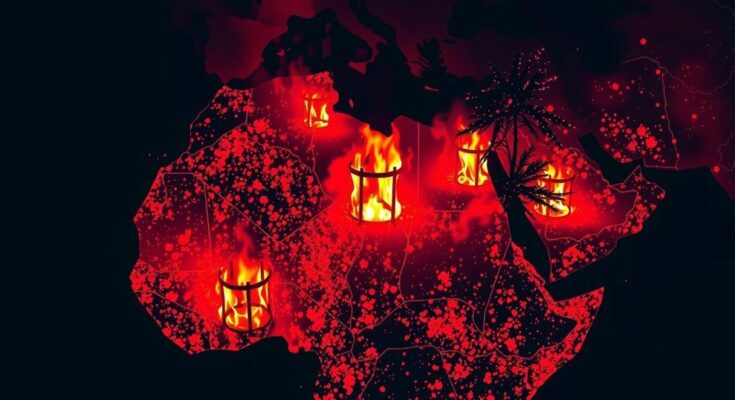Extremist attacks in the Sahel have surged, particularly impacting Mali and Burkina Faso. Military coups have failed to improve security, resulting in increased violence and civilian deaths. Jihadist groups, specifically JNIM and the Islamic State, have gained support through economic exploitation and social marginalization. The outlook remains dire as the violence spreads beyond the Sahel, with international counter-terrorism efforts facing significant challenges.
Extremist violence in the Sahel region of Africa, particularly in Mali, Niger, and Burkina Faso, has escalated dramatically in recent months, culminating in incidents such as a rare attack on the capital of Mali and significant assaults on villages in Burkina Faso, leading to numerous casualties among both civilians and military personnel. This worsening situation follows a series of military coups across these nations, wherein military junta governments have failed to bring about the promised security improvements, instead witnessing a record increase in violence and civilian deaths, which have risen by 25% in the first half of this year compared to previous periods.
The primary extremist factions operating in the Sahel include the al-Qaida-affiliated group Jama’at Nusrat al-Islam wal-Muslimin (JNIM) and the Islamic State in the Sahel. JNIM has reportedly garnered greater local support owing to its integration with regional rebel factions. In contrast, the Islamic State’s presence is more fragmented and lacks the same level of community involvement. Analysts indicate that the vacuum left by the withdrawal of Western military forces, alongside the economic decline and social marginalization, has enabled these groups to gain traction, appealing particularly to youth lacking job opportunities and security.
These extremist entities sustain themselves through various means, such as imposing taxes on local populations, controlling natural resources like gold, and engaging in organized crime, including human and drug trafficking. Their financial independence complicates efforts to dismantle their networks, as they adapt to countermeasures against specific revenue sources. As the military juntas focus on consolidating power, the outlook for the Sahel remains bleak, raising concerns about the spread of violence to neighboring countries like Benin and Togo. The international community, particularly the United States and Europe, is attempting to bolster counter-terrorism efforts in the region, despite challenges posed by restricted access to information and media censorship by these governments.
The Sahel is an arid region in Africa, south of the Sahara Desert, facing rampant extremism and political instability. Over the past decade, the region has experienced numerous military coups and uprisings, with Mali, Niger, and Burkina Faso currently under military rule. These governments, which emerged amidst widespread discontent with corrupt democratic regimes, have struggled to improve security and have overseen a dramatic increase in violence attributed to extremist groups. The socio-economic backdrop of high unemployment and marginalization contributes significantly to recruitment by jihadist organizations.
In summary, the security environment in the Sahel is deteriorating as extremist groups capitalize on the failures of military governments to provide safety and stability. With increasing violence and a burgeoning humanitarian crisis, the international community’s role becomes critical yet complicated by information suppression and local dynamics. Immediate steps must be taken to address not only the military and security challenges but also the economic grievances fueling extremism to restore peace and order in the region.
Original Source: www.voanews.com




